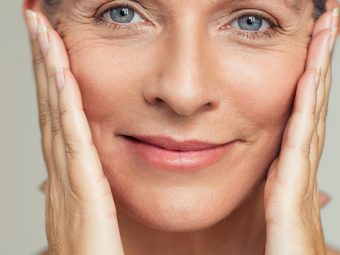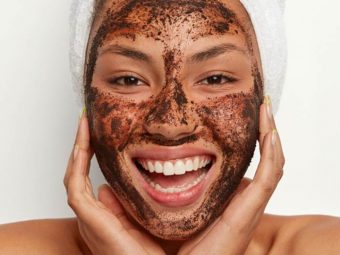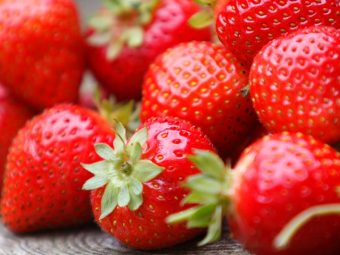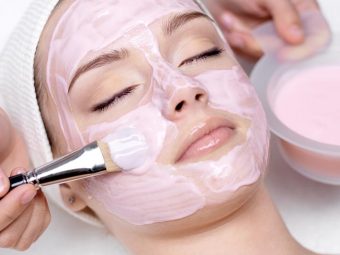Benefits Of Yogurt Face Mask
From dark circles to aging signs - yogurt face masks can address numerous skin issues.
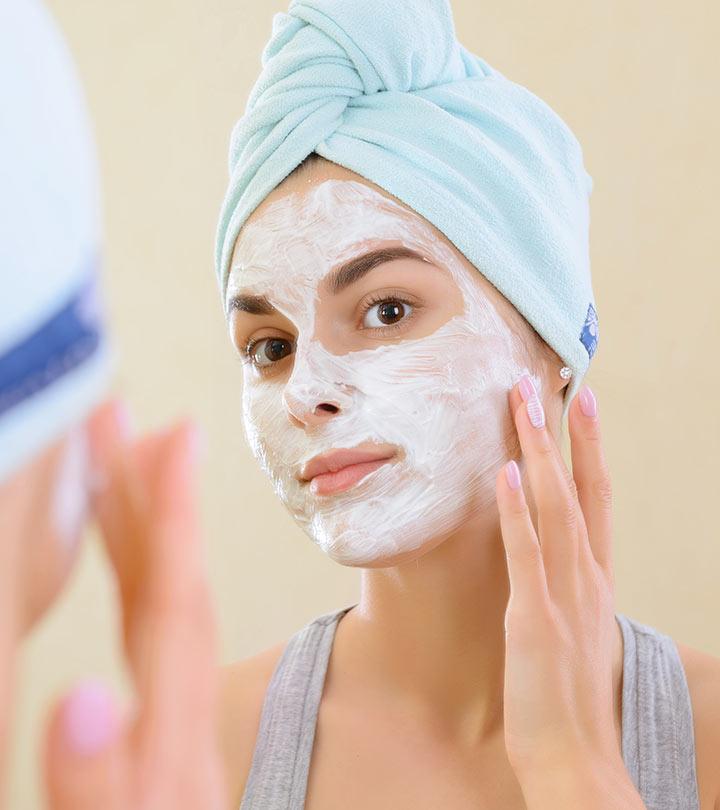
A yogurt face mask is a wonderful option for anyone who wants to incorporate yogurt into your skin care regimen. This probiotic has several benefits for your overall health. However, it can also help improve your skin health when used topically. Do you know how to use it? Read on to know the several benefits of yogurt for the skin and how to use it.
In This Article
Benefits Of Yogurt For Skin
1. Brightens Skin Tone
The lactic acid in yogurt inhibits the synthesis of tyrosinase. Tyrosinase is an enzyme responsible for melanin production, a substance that makes your skin tone dark. This way, yogurt may help enhance your skin tone (1).
2. Exfoliates Skin
The lactic acid in yogurt may also help in exfoliating your skin and improving skin cell turnover rate (2). Additionally, lactic acid does not irritate the skin while removing the dead skin cells.
3. May Help Reduce Acne
Yogurt contains zinc. Some research shows that zinc may help treat inflammatory acne (3).
4. Helps Treat Under-Eye Dark Circles
Anecdotal evidence suggests that the zinc in yogurt may help lighten blemishes and scars. Using yogurt under your eyes may help reduce the appearance of dark circles.
5. May Delay The Signs Of Aging
Yogurt contains bioactive peptide fractions that possess antioxidant properties. These properties help fight free radicals that may otherwise accelerate aging (4).
6. Combats Skin Infections
The lactic acid in yogurt possesses antifungal properties (5). These could help combat fungal infections on your skin.
There is a reason yogurt face masks can keep your skin glowing and youthful. They contain powerful nutrients that are skin-friendly and soothing. In the following section, we have briefly covered the most important nutrients present in yogurt.
What Are The Nutrients In Yogurt?
1. Zinc
100 grams of yogurt contain 1 mg of zinc. This mineral is renowned for its anti-inflammatory and antioxidant properties (6).
2. Calcium
Yogurt is a good source of calcium. Calcium is known to protect the skin from the outside environment (7).
3. B Vitamins
Yogurt is rich in vitamin B2 or riboflavin. Some believe riboflavin may help keep skin hydrated and protect skin from damage caused by free radicals. However, more research is warranted in this regard.
4. Lactic Acid
Lactic acid is the key ingredient of yogurt and a good exfoliant (2).
Are you excited to use yogurt on your face? Let us take a look at how you can use it as a face mask.
How To Use Yogurt On Your Face
1. Honey And Yogurt
Honey contains antimicrobial and antioxidant properties that may help your skin achieve a natural glow (8),(9).
What You Will Need
- ½ a cup of yogurt
- 2 tablespoons of honey
What You Have To Do
- Mix half a cup of yogurt with 2 tablespoons of honey in a bowl.
- Apply the mask evenly all over your neck and face.
- Leave the mask on for 20 minutes and rinse with warm water.
How Often You Should Do This
Do this once a week.
2. Strawberry And Yogurt (10).
What You Will Need
- 2 fresh strawberries
- ½ a cup of yogurt
What You Have To Do
- Blend 2 fresh strawberries and yogurt.
- Apply the paste all over your face with a brush.
- Leave it to dry and wash with cold water.
How Often You Should Do This
Do this once or twice a week.
3. Turmeric And Yogurt
Turmeric is rich in antimicrobial and anti-inflammatory properties (11). It may help treat acne breakouts when combined with yogurt.
What You Will Need
- ½ a cup of yogurt
- 1 tablespoon of turmeric powder
What You Have To Do
- Mix 1 tablespoon of turmeric powder and half a cup of yogurt.
- Apply the paste evenly all over your face and neck.
- Leave the mask on for 20 to 30 minutes and wash with warm water.
How Often You Should Do This
Do it once a week.
4. Oatmeal And Yogurt
Oatmeal helps exfoliate your skin without causing any irritation (12). Using it with yogurt can keep your skin clear.
What You Will Need
- 1 tablespoon of yogurt
- 1 tablespoon of blended oatmeal
- ½ a tablespoon of honey
What You Have To Do
- Mix all the ingredients in a bowl.
- Apply the paste all over your face and neck.
- Leave the mask on for 10 to 20 minutes and wash with warm water.
How Often You Should Do This
Do it once a week.
5. Avocado and Yogurt
Avocado is considered a natural moisturizer (13)
What You Need
- ½ a cup of yogurt
- ½ an avocado
- 2 tablespoons of aloe vera
What You Have To Do
- Mix all the ingredients in a bowl.
- Apply the mask evenly all over your face and neck.
- Wash it after 20 to 25 minutes.
How Often You Should Do This
Do it once a week.
While a yogurt face mask can work well on your skin, you must take certain precautions.
Things To Remember
- Those with sensitive skin may experience a slight tingling sensation when they apply the face mask. Some may even experience a stinging and burning sensation. In such cases, wash the face mask immediately with water and get an allergy test done. You could be allergic to the lactic acid or probiotics present in natural yogurt.
- If you are allergic to dairy products or alpha- and/or beta-hydroxy acids, avoid yogurt face masks.
- Purchase yogurt that is plain, organically produced, and replete with fat. Full-fat yogurt ensures your skin gets all the moisturization and nourishment it deserves.
Yogurt is a rich source of several important nutrients, like calcium, zinc, lactic acid, and B vitamins. Due to the presence of these nutrients, it acts as a wonderful ingredient you can incorporate into your daily skin care routine. It may help brighten your skin tone, exfoliate the skin, reduce acne breakouts, treat under-eye circles, and delay the signs of aging. It can also help fight off skin infections. Following the recipes and methods mentioned above can help you prepare yogurt face masks that help you treat all these issues.
Frequently Asked Questions
Which type of yogurt is good for a face mask?
Unflavored natural yogurt is always preferable for use in a face mask.
Can I use yogurt face masks every day?
Yes, you can use yogurt face masks every day. However, practice caution if you are allergic to any of the nutrients in yogurt.
Sources
Articles on StyleCraze are backed by verified information from peer-reviewed and academic research papers, reputed organizations, research institutions, and medical associations to ensure accuracy and relevance. Read our editorial policy to learn more.
- The inhibitory effect of glycolic acid and lactic acid on melanin synthesis in melanoma cells
https://onlinelibrary.wiley.com/doi/abs/10.1034/j.1600-0625.12.s2.7.x - Lactic acid applications in pharmaceutical and cosmeceutical industries
https://www.researchgate.net/profile/Azzam-Aladdin/publication/292990722_Lactic_acid_applications_in_pharmaceutical_and_cosmeceutical_industries/links/56b4a1b008ae922e6c02042d/Lactic-acid-applications-in-pharmaceutical-and-cosmeceutical-industries.pdf - Clinical evaluation in acne
https://europepmc.org/article/med/6451126 - Determination of antioxidant activity of bioactive peptide fractions obtained from yogurt
https://www.sciencedirect.com/science/article/pii/S0022030211005571 - Contribution of volatiles to the antifungal effect of Lactobacillus paracasei in defined medium and yogurt
https://www.sciencedirect.com/science/article/abs/pii/S0168160514005467 - Clinical, immunological, anti-inflammatory and antioxidant roles of zinc
https://www.sciencedirect.com/science/article/abs/pii/S0531556507002458 - Skin Barrier and Calcium
https://www.ncbi.nlm.nih.gov/pmc/articles/PMC5929942 - Honey: A realistic antimicrobial for disorders of the skin
https://www.sciencedirect.com/science/article/pii/S168411821500033X - Honey in dermatology and skin care: a review
https://onlinelibrary.wiley.com/doi/abs/10.1111/jocd.12058 - Strawberry-Based Cosmetic Formulations Protect Human Dermal Fibroblasts against UVA-Induced Damage
https://www.ncbi.nlm.nih.gov/pmc/articles/PMC5490584/ - Turmeric and curcumin: Biological actions and medicinal applications
https://www.jstor.org/stable/24107978?seq=1 - Anti-Inflammatory Activities of Colloidal Oatmeal (Avena sativa) Contribute to the Effectiveness of Oats in Treatment of Itch Associated With Dry, Irritated Skin
https://www.researchgate.net/publication/271332623_Anti-Inflammatory_Activities_of_Colloidal_Oatmeal_Avena_sativa_Contribute_to_the_Effectiveness_of_Oats_in_Treatment_of_Itch_Associated_With_Dry_Irritated_Skin - Study On Avocado Oil Quality, Its Characteris And Composition
http://dr.lib.sjp.ac.lk/bitstream/handle/123456789/5429/Study%20on%20avacardo%20oil%20quality,%20its%20characteristics%20and%20composition-001-015.pdf?sequence=5




